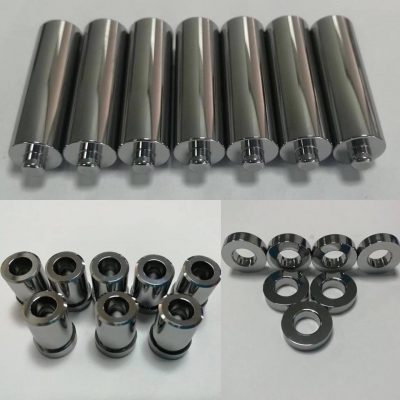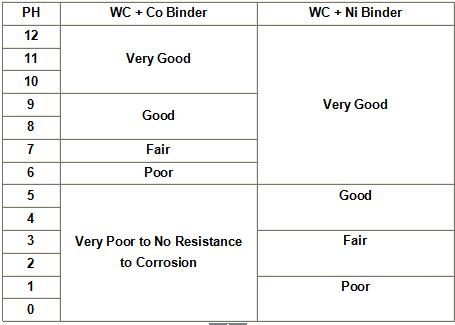 Corrosion resistance is considered one of the most important properties for tungsten carbides, it shows significant importance when it comes to applications such as seal rings, fluid control components, choke valves, nozzles, and bearings. Although tungsten carbide is of better corrosion resistance compared with other steel alloys in general, there are still things we need to pay attention to when choosing the correct corrosion-resistant strength tungsten carbide.
Corrosion resistance is considered one of the most important properties for tungsten carbides, it shows significant importance when it comes to applications such as seal rings, fluid control components, choke valves, nozzles, and bearings. Although tungsten carbide is of better corrosion resistance compared with other steel alloys in general, there are still things we need to pay attention to when choosing the correct corrosion-resistant strength tungsten carbide.
Cobalt is the most widely added binder or ‘cement’ in cemented tungsten carbides due to its function to wet tungsten carbide grains on the process of liquid phase sintering. So, cobalt is considered to be superior to other binder when it comes to eliminating residual porosity and gaining high strength and toughness properties in sintered products. Nevertheless, the failure of cemented carbides in corrosive conditions is mostly due to the chemical reaction of cobalt with corrosive agents. The corrosion process includes the dissolution of cobalt binder on the contact surface leaving a loosely knit skeleton of tungsten carbide grains with rarely structural integrity. This process is often defined as cobalt “leaching” and is typically accompanied by a spalling of unsupported carbide grains on the exposed surfaces.
Although tungsten carbide with Cobalt binder grains have nice resistance to corrosion of gasoline, acetone, ethanol, other organic solvents, ammonia, bases, weak acids, and tap water. However, the binder can be rapid deteriorated after exposure to hydrochloric,hydrofluoric, and other strong acid. Corrosion strength are also affected by temperature, density and electric conductivity of the corrosive agents. Alloying cobalt with chromium, molybdenum, or nickel can improve the corrosion resistance of the binder, but the total substitution of nickel for cobalt has proven to be the most effective means of increasing the lifespan of tungsten carbides in strong corrosive environments.
The chart below shows general corrosion ratings for Co and Ni binder grades as a function of pH value.
Resistance of Corrosion of Co and Ni Binders as a Function of pH Value

Dongguan JLS Precision Mold Parts Co.,Ltd imports tungsten carbide with fair and/or excellent corrosion resistance strengths depending on the different applications. For normal precision carbide punch for stamping die, the cemented carbide with “fair corrosion resistance strengths ” is working fine. The selection of tungsten carbides totally depends on which circumstances the carbide button dies used in.





